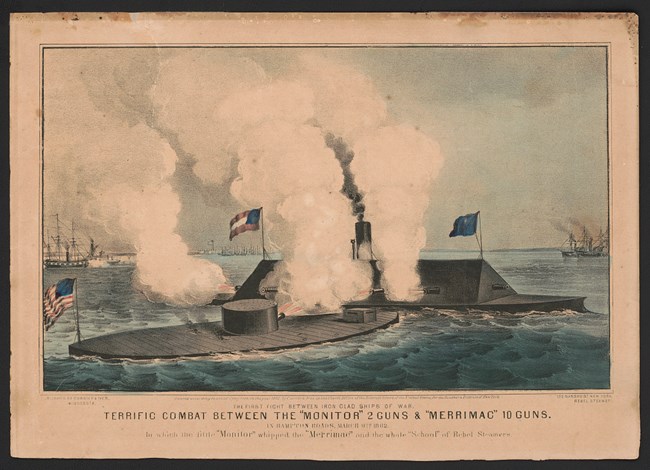Last updated: March 9, 2018
Article
Battle of the Ironclads

Library of Congress
On March 9, 1862, one of the most famous naval battles in American history occurred as two ironclads, the U.S.S.Monitor and the C.S.S. Virginia fought to a draw off Hampton Roads, Virginia. The ships fired on each other all morning but their armor plates deflected the shots, signaling a new era of steam-powered iron ships.
The C.S.S. Virginia was originally the U.S.S. Merrimack, a 40-gun frigate launched in 1855. The Confederates captured it and covered it in armor plating above the waterline. Outfitted with powerful guns, the Virginia was a formidable vessel when the Confederates launched the ship in February 1862. On March 8, the Virginia sunk two Union ships and ran one aground off Hampton Roads.
The next day, the U.S.S. Monitor steamed into the Chesapeake Bay. Designed by Swedish engineer John Ericsson, the vessel had a low profile, rising from the water only 18 inches. The flat iron deck had a 20-foot cylindrical turret rising from the middle of the ship that housed two 11-inch Dahlgren guns. Commissioned on February 25, 1862, it arrived at Chesapeake Bay just in time to engage the Virginia.
The battle between the two vessels began on the morning of March 9 and continued for four hours. The ships circled one another, jockeying for position as they fired. The cannon balls simply deflected off the iron ships. In the early afternoon, the Virginia pulled back to Norfolk. Neither ship was seriously damaged, but the Monitor effectively ended the short reign of terror that the Confederate ironclad had brought to the Union navy.
Both ships met ignominious ends. When the Yankees invaded the James Peninsula two months after the battle at Hampton Roads, the retreating Confederates scuttled their ironclad. The Monitor went down in bad weather off Cape Hatteras, North Carolina, at the end of the year. The Monitor's wreck was discovered in 1973 and has been partially salvaged. Her guns, gun turret, engine and other relics are on display at the Mariners' Museum in Newport News, Virginia. Though they had short lives, the two ships ushered in a new era in naval warfare.
